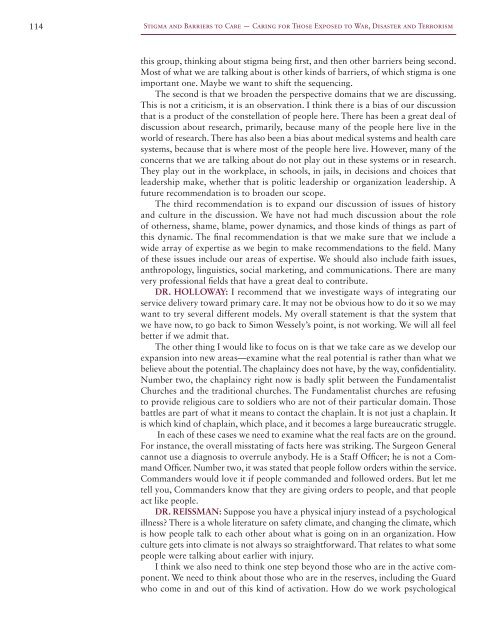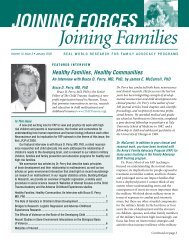stigma and barriers to care - Uniformed Services University of the ...
stigma and barriers to care - Uniformed Services University of the ...
stigma and barriers to care - Uniformed Services University of the ...
Create successful ePaper yourself
Turn your PDF publications into a flip-book with our unique Google optimized e-Paper software.
114<br />
Stigma <strong>and</strong> Barriers <strong>to</strong> Care — Caring for Those Exposed <strong>to</strong> War, Disaster <strong>and</strong> Terrorism<br />
this group, thinking about <strong>stigma</strong> being first, <strong>and</strong> <strong>the</strong>n o<strong>the</strong>r <strong>barriers</strong> being second.<br />
Most <strong>of</strong> what we are talking about is o<strong>the</strong>r kinds <strong>of</strong> <strong>barriers</strong>, <strong>of</strong> which <strong>stigma</strong> is one<br />
important one. Maybe we want <strong>to</strong> shift <strong>the</strong> sequencing.<br />
The second is that we broaden <strong>the</strong> perspective domains that we are discussing.<br />
This is not a criticism, it is an observation. I think <strong>the</strong>re is a bias <strong>of</strong> our discussion<br />
that is a product <strong>of</strong> <strong>the</strong> constellation <strong>of</strong> people here. There has been a great deal <strong>of</strong><br />
discussion about research, primarily, because many <strong>of</strong> <strong>the</strong> people here live in <strong>the</strong><br />
world <strong>of</strong> research. There has also been a bias about medical systems <strong>and</strong> health <strong>care</strong><br />
systems, because that is where most <strong>of</strong> <strong>the</strong> people here live. However, many <strong>of</strong> <strong>the</strong><br />
concerns that we are talking about do not play out in <strong>the</strong>se systems or in research.<br />
They play out in <strong>the</strong> workplace, in schools, in jails, in decisions <strong>and</strong> choices that<br />
leadership make, whe<strong>the</strong>r that is politic leadership or organization leadership. A<br />
future recommendation is <strong>to</strong> broaden our scope.<br />
The third recommendation is <strong>to</strong> exp<strong>and</strong> our discussion <strong>of</strong> issues <strong>of</strong> his<strong>to</strong>ry<br />
<strong>and</strong> culture in <strong>the</strong> discussion. We have not had much discussion about <strong>the</strong> role<br />
<strong>of</strong> o<strong>the</strong>rness, shame, blame, power dynamics, <strong>and</strong> those kinds <strong>of</strong> things as part <strong>of</strong><br />
this dynamic. The final recommendation is that we make sure that we include a<br />
wide array <strong>of</strong> expertise as we begin <strong>to</strong> make recommendations <strong>to</strong> <strong>the</strong> field. Many<br />
<strong>of</strong> <strong>the</strong>se issues include our areas <strong>of</strong> expertise. We should also include faith issues,<br />
anthropology, linguistics, social marketing, <strong>and</strong> communications. There are many<br />
very pr<strong>of</strong>essional fields that have a great deal <strong>to</strong> contribute.<br />
DR. HOLLOWAY: I recommend that we investigate ways <strong>of</strong> integrating our<br />
service delivery <strong>to</strong>ward primary <strong>care</strong>. It may not be obvious how <strong>to</strong> do it so we may<br />
want <strong>to</strong> try several different models. My overall statement is that <strong>the</strong> system that<br />
we have now, <strong>to</strong> go back <strong>to</strong> Simon Wessely’s point, is not working. We will all feel<br />
better if we admit that.<br />
The o<strong>the</strong>r thing I would like <strong>to</strong> focus on is that we take <strong>care</strong> as we develop our<br />
expansion in<strong>to</strong> new areas—examine what <strong>the</strong> real potential is ra<strong>the</strong>r than what we<br />
believe about <strong>the</strong> potential. The chaplaincy does not have, by <strong>the</strong> way, confidentiality.<br />
Number two, <strong>the</strong> chaplaincy right now is badly split between <strong>the</strong> Fundamentalist<br />
Churches <strong>and</strong> <strong>the</strong> traditional churches. The Fundamentalist churches are refusing<br />
<strong>to</strong> provide religious <strong>care</strong> <strong>to</strong> soldiers who are not <strong>of</strong> <strong>the</strong>ir particular domain. Those<br />
battles are part <strong>of</strong> what it means <strong>to</strong> contact <strong>the</strong> chaplain. It is not just a chaplain. It<br />
is which kind <strong>of</strong> chaplain, which place, <strong>and</strong> it becomes a large bureaucratic struggle.<br />
In each <strong>of</strong> <strong>the</strong>se cases we need <strong>to</strong> examine what <strong>the</strong> real facts are on <strong>the</strong> ground.<br />
For instance, <strong>the</strong> overall misstating <strong>of</strong> facts here was striking. The Surgeon General<br />
cannot use a diagnosis <strong>to</strong> overrule anybody. He is a Staff Officer; he is not a Comm<strong>and</strong><br />
Officer. Number two, it was stated that people follow orders within <strong>the</strong> service.<br />
Comm<strong>and</strong>ers would love it if people comm<strong>and</strong>ed <strong>and</strong> followed orders. But let me<br />
tell you, Comm<strong>and</strong>ers know that <strong>the</strong>y are giving orders <strong>to</strong> people, <strong>and</strong> that people<br />
act like people.<br />
DR. REISSMAN: Suppose you have a physical injury instead <strong>of</strong> a psychological<br />
illness There is a whole literature on safety climate, <strong>and</strong> changing <strong>the</strong> climate, which<br />
is how people talk <strong>to</strong> each o<strong>the</strong>r about what is going on in an organization. How<br />
culture gets in<strong>to</strong> climate is not always so straightforward. That relates <strong>to</strong> what some<br />
people were talking about earlier with injury.<br />
I think we also need <strong>to</strong> think one step beyond those who are in <strong>the</strong> active component.<br />
We need <strong>to</strong> think about those who are in <strong>the</strong> reserves, including <strong>the</strong> Guard<br />
who come in <strong>and</strong> out <strong>of</strong> this kind <strong>of</strong> activation. How do we work psychological




